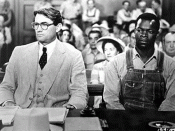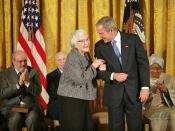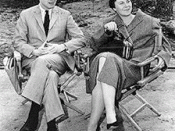In the novel, To Kill a Mockingbird, Harper Lee makes a thematic statement on the prejudices and racism in modern society. Prejudice is defined as a preconceived judgment or opinion towards an object, person, or race. In To Kill a Mockingbird, the harsh realities of the 1930s - and the segregation of Black from White - are powerfully expressed by a few primary "mockingbirds" and an idol propagator of prejudice. Although Arthur Radley and Tom Robinson are victims of bigotry, Aunt Alexandra is an ultimate perpetuator of prejudice.
Arthur Boo Radley is a central target of prejudice. In Maycomb, almost everyone has prejudices towards Arthur Radley. However, the people of Maycomb believe what they hear about Boo, because they only hear what they listen for. (Lee, 174)
Many legends and stereotypes about Boo are distributed among Maycomb citizens. Hypothetically, rumours state "he went out at night when the moon was down, and peeped in windows".
(Lee, 9) Also, legend has it that Boo once "drove the scissors into his parent's leg, pulled them out, wiped them on his pants". (Lee, 11) Finally, Arthur is believed to be a "malevolent phantom". (Lee, 8)
Arthur stays inside his house to avoid confrontation with the prejudices in his society, and therefore, is completely alienated. At a mature age, Jem can ponder if Boo is "shut up in the house all this time ... because he wants to stay inside". (Lee, 227) Dill supplements Jem's theory by stating that Boo maybe "doesn't have anywhere to run off to..." (Lee, 144)
At the end of the novel, Heck Tate and Atticus decide not to "kill" Boo, and spare him the widespread attention and trials he would receive if the truth about Bob Ewell's death was exposed. The children - Jem, Dill, and Scout -...


